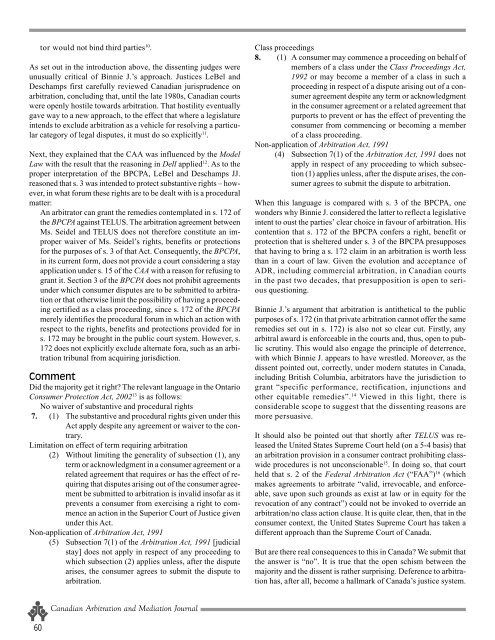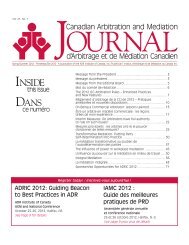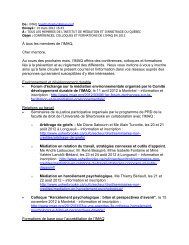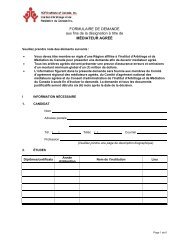Printemps 2011 - ADR Institute of Canada
Printemps 2011 - ADR Institute of Canada
Printemps 2011 - ADR Institute of Canada
Create successful ePaper yourself
Turn your PDF publications into a flip-book with our unique Google optimized e-Paper software.
tor would not bind third parties 10 .As set out in the introduction above, the dissenting judges wereunusually critical <strong>of</strong> Binnie J.’s approach. Justices LeBel andDeschamps first carefully reviewed Canadian jurisprudence onarbitration, concluding that, until the late 1980s, Canadian courtswere openly hostile towards arbitration. That hostility eventuallygave way to a new approach, to the effect that where a legislatureintends to exclude arbitration as a vehicle for resolving a particularcategory <strong>of</strong> legal disputes, it must do so explicitly 11 .Next, they explained that the CAA was influenced by the ModelLaw with the result that the reasoning in Dell applied 12 . As to theproper interpretation <strong>of</strong> the BPCPA, LeBel and Deschamps JJ.reasoned that s. 3 was intended to protect substantive rights – however,in what forum these rights are to be dealt with is a proceduralmatter:An arbitrator can grant the remedies contemplated in s. 172 <strong>of</strong>the BPCPA against TELUS. The arbitration agreement betweenMs. Seidel and TELUS does not therefore constitute an improperwaiver <strong>of</strong> Ms. Seidel’s rights, benefits or protectionsfor the purposes <strong>of</strong> s. 3 <strong>of</strong> that Act. Consequently, the BPCPA,in its current form, does not provide a court considering a stayapplication under s. 15 <strong>of</strong> the CAA with a reason for refusing togrant it. Section 3 <strong>of</strong> the BPCPA does not prohibit agreementsunder which consumer disputes are to be submitted to arbitrationor that otherwise limit the possibility <strong>of</strong> having a proceedingcertified as a class proceeding, since s. 172 <strong>of</strong> the BPCPAmerely identifies the procedural forum in which an action withrespect to the rights, benefits and protections provided for ins. 172 may be brought in the public court system. However, s.172 does not explicitly exclude alternate fora, such as an arbitrationtribunal from acquiring jurisdiction.CommentDid the majority get it right? The relevant language in the OntarioConsumer Protection Act, 2002 13 is as follows:No waiver <strong>of</strong> substantive and procedural rights7. (1) The substantive and procedural rights given under thisAct apply despite any agreement or waiver to the contrary.Limitation on effect <strong>of</strong> term requiring arbitration(2) Without limiting the generality <strong>of</strong> subsection (1), anyterm or acknowledgment in a consumer agreement or arelated agreement that requires or has the effect <strong>of</strong> requiringthat disputes arising out <strong>of</strong> the consumer agreementbe submitted to arbitration is invalid ins<strong>of</strong>ar as itprevents a consumer from exercising a right to commencean action in the Superior Court <strong>of</strong> Justice givenunder this Act.Non-application <strong>of</strong> Arbitration Act, 1991(5) Subsection 7(1) <strong>of</strong> the Arbitration Act, 1991 [judicialstay] does not apply in respect <strong>of</strong> any proceeding towhich subsection (2) applies unless, after the disputearises, the consumer agrees to submit the dispute toarbitration.Class proceedings8. (1) A consumer may commence a proceeding on behalf <strong>of</strong>members <strong>of</strong> a class under the Class Proceedings Act,1992 or may become a member <strong>of</strong> a class in such aproceeding in respect <strong>of</strong> a dispute arising out <strong>of</strong> a consumeragreement despite any term or acknowledgmentin the consumer agreement or a related agreement thatpurports to prevent or has the effect <strong>of</strong> preventing theconsumer from commencing or becoming a member<strong>of</strong> a class proceeding.Non-application <strong>of</strong> Arbitration Act, 1991(4) Subsection 7(1) <strong>of</strong> the Arbitration Act, 1991 does notapply in respect <strong>of</strong> any proceeding to which subsection(1) applies unless, after the dispute arises, the consumeragrees to submit the dispute to arbitration.When this language is compared with s. 3 <strong>of</strong> the BPCPA, onewonders why Binnie J. considered the latter to reflect a legislativeintent to oust the parties’ clear choice in favour <strong>of</strong> arbitration. Hiscontention that s. 172 <strong>of</strong> the BPCPA confers a right, benefit orprotection that is sheltered under s. 3 <strong>of</strong> the BPCPA presupposesthat having to bring a s. 172 claim in an arbitration is worth lessthan in a court <strong>of</strong> law. Given the evolution and acceptance <strong>of</strong><strong>ADR</strong>, including commercial arbitration, in Canadian courtsin the past two decades, that presupposition is open to seriousquestioning.Binnie J.’s argument that arbitration is antithetical to the publicpurposes <strong>of</strong> s. 172 (in that private arbitration cannot <strong>of</strong>fer the sameremedies set out in s. 172) is also not so clear cut. Firstly, anyarbitral award is enforceable in the courts and, thus, open to publicscrutiny. This would also engage the principle <strong>of</strong> deterrence,with which Binnie J. appears to have wrestled. Moreover, as thedissent pointed out, correctly, under modern statutes in <strong>Canada</strong>,including British Columbia, arbitrators have the jurisdiction togrant “specific performance, rectification, injunctions andother equitable remedies”. 14 Viewed in this light, there isconsiderable scope to suggest that the dissenting reasons aremore persuasive.It should also be pointed out that shortly after TELUS was releasedthe United States Supreme Court held (on a 5-4 basis) thatan arbitration provision in a consumer contract prohibiting classwideprocedures is not unconscionable 15 . In doing so, that courtheld that s. 2 <strong>of</strong> the Federal Arbitration Act (“FAA”) 16 (whichmakes agreements to arbitrate “valid, irrevocable, and enforceable,save upon such grounds as exist at law or in equity for therevocation <strong>of</strong> any contract”) could not be invoked to override anarbitration/no class action clause. It is quite clear, then, that in theconsumer context, the United States Supreme Court has taken adifferent approach than the Supreme Court <strong>of</strong> <strong>Canada</strong>.But are there real consequences to this in <strong>Canada</strong>? We submit thatthe answer is “no”. It is true that the open schism between themajority and the dissent is rather surprising. Deference to arbitrationhas, after all, become a hallmark <strong>of</strong> <strong>Canada</strong>’s justice system.Canadian Arbitration and Mediation Journal60







